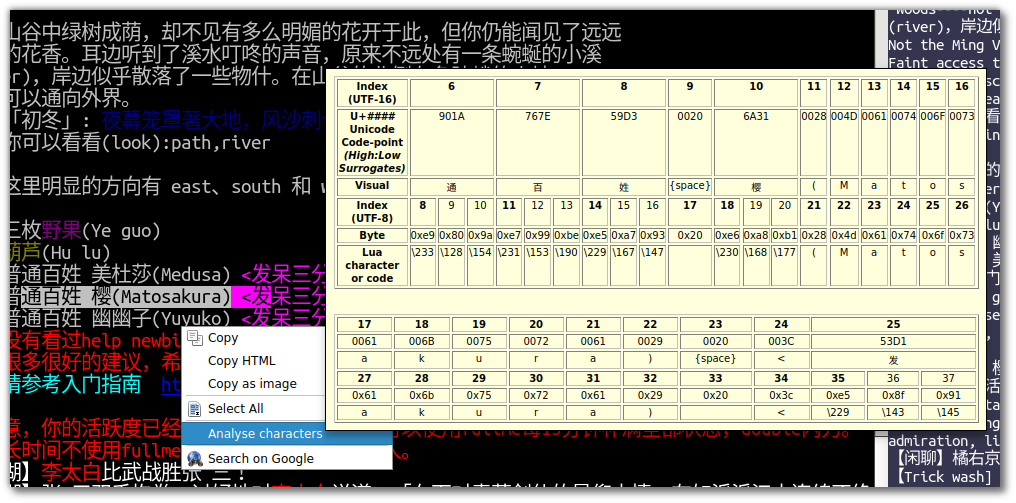

- MUDLET USE LUA SOCKET FOR FREE
- MUDLET USE LUA SOCKET HOW TO
- MUDLET USE LUA SOCKET FULL
- MUDLET USE LUA SOCKET SOFTWARE
- MUDLET USE LUA SOCKET CODE
I'm not sure what the unpack() part of the function is doing exactly, since I can't find reference to it in any of demonnic's other code. These are the attribute the other gauges have, that I want to add:
MUDLET USE LUA SOCKET HOW TO
I'm mostly fine with that, but I'm not sure how to modify that style sheet, either before or after that gets called. The gauge that gets spit out is clunky in comparison to the sleek, lean look of the other gauges and windows I've stolen, and I want to pretty it up, but the only reference to the gauge style I can find is:ĭ:setStyleSheet(unpack(args))
MUDLET USE LUA SOCKET CODE
This is more about labels than the specific anitimer code though. I'm working with demonnic's anitimer, which is giving me a formatting problem. There's probably a way to add a whole new 'family' category to nameDB, but again. The obvious disadvantage to this method is that you can't track what Orders the Shevats are in at the same time. Or you can MMCONFIG SHEVATCOLOR (whatever) to set it. I'm not good enough to do that.įrom there, MMCONFIG POLITICS will let you muck about with the highlights just like normal. There's probably also a way to build a trigger on FWHO or FAMILY TREE SHEVAT to mass add people, but. Then you can manually add family members the same way. Starting off you can do: 'ndb set Daraius order Shevat' and a new order will be added (Shevat's order) with Daraius as a member. I'm not 100% sure on the specifics here, but if you use m&mf and NameDB, then you can set a new order, Shevat, and then add people to it. Right now I just have a highlight trigger with each name entered manually, but I suspect there's a much more efficient and effective way to go about it. So I want all my lovely family members' names highlighted in Shevat beryl. I'm guessing I can add a line to the following to check for dreamweaving:
MUDLET USE LUA SOCKET SOFTWARE
This software wouldnt've been possible without these open source packages:Ĭredit to Markdownify for the README inspiration.I'm not sure how to do most of that, but it seems reasonable. See the project's roadmap to get an idea of where it's headed, as well as contribute! CreditsĪuthor: Mudlet Makers. Mudlet's vision is to build the best text gaming experience possible to nurture & grow this niche scene.

Download and double-click on Mudlet to run.
MUDLET USE LUA SOCKET FOR FREE
Downloadĭownload for free from How To Use Mudlet is available on Linux (both 32bit and 64bit), Windows, and macOS you may be able to run it on additional platforms as well. We believe in making Mudlet available to people on all major platforms, and we work on keeping cross-platform compatibility right from start. Best of all, the Lua API is seamlessly integrated in Mudlet and shared by all aliases, triggers, scripts, keybindings, buttons and other Mudlet components. This allows Mudlet to leverage the existing community and large ecosystem of existing packages for Lua without the many drawbacks of creating a Mudlet specific scripting language. Mudlet features a scripting framework using Lua – a small, fast and efficient scripting language. All in all, we are very serious about Mudlet being quick – and take all measures to make it so. Its scripting engine is designed to scale to large systems without bogging down – and the text display is designed to handle thousands of lines in under a second. Mudlet is designed and built to be very fast and efficient right from the start. This applies to both the power users and usual gamers – everyone will feel at home with Mudlet, without having to waste too much time figuring out how to do something. We’re big on usability, and as such, creating an easy to use client and interface is one of the defining goals of the project.
MUDLET USE LUA SOCKET FULL


 0 kommentar(er)
0 kommentar(er)
